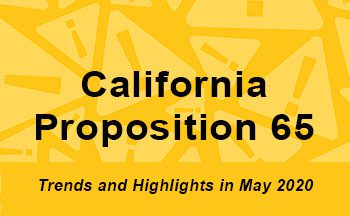Proposition 65 Notices of the Month – May 2020: Seafood, Waffles, Nut Products, Canned Goods, and Boxing Gloves Targeted by Plaintiffs in Third Month of COVID-19 Pandemic
June 2020
Proposition 65: Trends and Highlights in May 2020
As COVID-19, shelter-in-place orders and California Court closures continued into May, Proposition 65 (“Prop. 65”) Plaintiffs likewise continued to be resourceful. New claims varied as to the types of products and chemicals targeted, while claims also slowed in overall numbers. In March, and at the beginning of the COVID-19 pandemic, Plaintiffs sent over 300 total 60-day Prop. 65 Notices of Violation (“Notices”). This number has dwindled to just below 200 Notices in the month of May.
As usual, a substantial portion of the claims alleged that consumer products, hardware, and housewares contain lead and plasticizers and therefore required a Prop. 65 warning. In addition, food claims were both substantial in number and in variety, and a number of Notices sent previously for vinegars, which we highlighted last month were withdrawn.
Prop. 65, also known as the Safe Drinking Water and Toxic Enforcement Act of 1986, requires “clear and reasonable warnings” on consumer products (including foods) sold in California, if use of the products causes an exposure to chemicals on the Prop. 65 List. Our monthly overview of product trends in the Notices is as follows.
- Lead, Arsenic and Cadmium in Seaweed and Seafood Products. Again in May, Plaintiff groups continued to allege that heavy metals in seaweed and other seafood products require a Prop. 65 warning. 14 Notices alleged that seaweed products contained metals and required warnings. Plaintiffs sent an additional 15 Notices for squid, clams, cuttlefish, oysters, mussels and snail products, alleging that these seafood products also contained metals and required warnings.
- Acrylamide in Waffles, Breads and Nut Products. Notices alleging that the acrylamide content in waffles (gluten-free included) and gluten-free breads were also abundant in May (18 Notices sent in total). Several Notices in May also alleged that almond and cashew products contained acrylamide and thus required a warning. This is consistent with the high volume of Notices regarding alleged acrylamide content in breads, cookies, crackers, chips and nut products over the last several months.
- Furan in Canned Goods. Two Notices were sent in May alleging that furan content in canned goods required a warning. These two Notices are the first time that Plaintiff groups have alleged that furan content in foods requires a Prop. 65 warning.
- Lead and Plasticizers in Consumer Products: Finally, lead content in consumer products continues to be a common Prop. 65 chemical target in Notices. Noteworthy types of products Noticed in May for lead included ceramics and boxing gloves. Plastic bags, cases and apparel containing phthalate plasticizers, Di(2-ethylhexyl)phthalate (“DEHP”) (the most common type of phthalate plasticizer), and Diisononyl Phthalate (“DINP”) (another type of phthalate) were also the subject of a number of Notices in May.
As summer approaches and COVID-19 shelter-in-place orders are lifted, the re-opening of California courts (in varying degrees and in varying stages) is also occurring throughout the State. With this gradual re-opening, the regulated community should expect to see a number of cases filed in the courts seeking to prosecute claims in Notices sent over the COVID-19 period. Moreover, because brick-and-mortar stores are reopening to customers, Prop. 65 Plaintiff groups will be purchasing and testing more products, and searching for Prop. 65 “violations” to allege in new Notices. As always, it is crucial for those subject to Prop. 65 to evaluate Notices received and the chemical content of products alleged to be in violation of the law, to determine the appropriate course of action and whether to post the Prop. 65 warning on their products.

